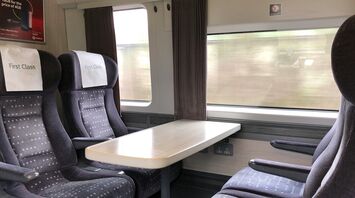Interior Innovations: Meet the Future of Aircraft Cabins

Music without headphones, origami doors, and creative seating solutions may soon appear on an aircraft near you! Creative aircraft cabin solutions from around the world were recognized at the RedCabin inaugural Trinity Awards in Texas on Friday. Held alongside the Aircraft Cabin Innovation Summit, the awards ceremony highlighted the future of aircraft interiors. The entries were judged by a panel of experts from airlines, manufacturers, and aircraft leasing companies, and the winners received a chance to work with a major airline.
Elevating the Passenger Experience
Passengers looking to enjoy in-flight entertainment have long struggled with connecting wired (and now Bluetooth) headphones to the entertainment system in aircraft, and the winner for the Passenger Experience Concepts category is looking to solve that problem with headphones that are built into the seat. The panel of judges was most impressed by 'Euphony' from Safran. The winning technology places speakers by Devialet inside the headrest, which provides audio directly to the passenger's ears without being a nuisance to the rest of the cabin.
Several proposed designs sought new solutions to longstanding issues in the aviation industry, specifically around flight experiences for people with reduced mobility and a range of visible and non-visible disabilities. A second finalist, 'Air 4 All' from Delta Flight Products, eliminates the need to transfer from wheelchairs to airline seats. It allows powered wheelchair users to remain in their wheelchairs for the entire journey thanks to convertible seats that can be used traditionally or folded up to accommodate wheelchairs.
Diehl Aviation's 'eSmart Lavatory' rounded out the top three finalists. The concept redefines the aircraft lavatory experience with features that include touchless controls to ensure a hygienic environment, an innovative smart mirror, and a time management system that allows time slots to be booked in the lavatory via smartphone.
Evolving the Cabin Experience
Taking the cake in the Cabin Experience Concepts category is 'Door 2.0 - The Zen Door' from Unum Aircraft Seating. The next-generation lightweight privacy door for business class seating draws its design inspiration from the ancient art of origami. The resulting business-class door is significantly less complex and, therefore, lighter than existing solutions on the market.
Looking to solve two of the industry's biggest problems, the 'Jump Seat Duo' from J&C Aero serves as both a seat for flight attendants during takeoff and landing and an onboard wheelchair for passengers with reduced mobility. The innovative design was created with aircraft compliance in mind. It can easily be installed on existing narrowbody aircraft to provide a comfortable dual-purpose seat that saves on weight and helps ensure a dignified and smooth passenger boarding process.
A third finalist, the 'Clear Cabin' from ACLA Studio, is a class divider with a 33" transparent OLED screen. The inclusion of a digital screen into the conventional class divider allows the previously overlooked space to become a point of information for passengers. Once installed, the screen can show everything from food and beverage options to maps of the airport to facilitate seamless navigation to connecting flights.
Seeking Innovation in Sustainability
Lightweight seating technologies topped the list of finalists as aircraft manufacturers and operators look to reduce onboard weight and, consequently, emissions. The panel of expert judges picked 'Ultra Slim Low Carbon Seat' from DOY Design Limited as the winner in the Sustainability Concepts category. The circular economy seat concept is designed to reduce embedded carbon by 70% with the inclusion of recycled materials such as aluminum, which can be readily recycled.
Other finalists included seats made specifically for the single-aisle market, such as the 'Ti-seat 2' from Expliseat SAS. It aims to revolutionize the air travel experience with a seat that prioritizes passenger comfort and durability and sets a new standard for environmental responsibility. The ultra-light all-carbon and titanium structure, with recycled components and minimal plastic, is 30% lighter than a traditional seat yet still fitted with leather and ergonomic foam for added comfort.
A third finalist, Diab Group's 'Sustainable Panel For Cabin Interior,' is a sustainable lightweight panel for cabin interiors that combines the advantages of Diab's structural foam core Divinycell F and thermoplastic organosheets to create a panel that uses only materials fully compliant with all industry requirements. Notably, the panel already includes recycled content from Diab's production waste and is consequently 100% waste-free.



















